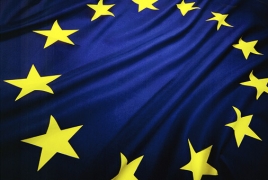Turkey vocal in support for Azerbaijan during 4-day war in Karabakh: EC November 14, 2016 - 15:22 AMT PanARMENIAN.Net - Turkey was vocal in its support for Azerbaijan during clashes in April 2016 in Nagorno Karabakh, the European Commission said in its Turkey 2016 Report. Azerbaijan on April 2 unleashed an overt military offensive against Karabakh, which claimed hundreds of lives on both sides. The parties reached an agreement on cessation of hostilities on April 5. The 2009 protocols on normalisation of relations with Armenia are not yet ratified, the Commission went on to say. "The Armenian Patriarchate’s proposal to open a university department for Armenian language and clergy has been pending for several years. Similar demands have been made by different Christian communities who sought to train clergy. Similar problems exist over the construction of places of worship. Hate speech and hate crimes against Christians and Jews continued to be repeatedly reported (minorities). Inter-religious dialogue remains an important element in this area," the report said. "Hate speech and threats directed against minorities remained a serious problem and long delays in cases where religious representatives or their property were attacked amount to impunity."  The conflict between Nagorno Karabakh and Azerbaijan The conflict between Nagorno Karabakh and Azerbaijan broke out as result of the ethnic cleansing launched by the Azeri authorities in the final years of the Soviet Union. The Karabakh War was fought from 1991 (when the Nagorno Karabakh Republic was proclaimed) to 1994 (when a ceasefire was sealed by Armenia, NKR and Azerbaijan). Most of Nagorno Karabakh and a security zone consisting of 7 regions are now under control of NKR defense army. Armenia and Azerbaijan are holding peace talks mediated by the OSCE Minsk Group up till now. The Armenian Genocide The Armenian Genocide (1915-23) was the deliberate and systematic destruction of the Armenian population of the Ottoman Empire during and just after World War I. It was characterized by massacres and deportations, involving forced marches under conditions designed to lead to the death of the deportees, with the total number of deaths reaching 1.5 million. Six total incidents have burned 19 old-growth trees. Friday night 8 trees were torched along the beautiful main entrance. The EU does not intend to conduct military exercises with Armenia, Lead Spokesperson for EU Foreign Affairs and Security Policy Peter Stano says. Hikmet Hajiyev has said that there is no place for USAID operation in Azerbaijan any longer. A telephone conversation between Putin and Pashinyan before the CSTO summit is not planned, Peskov says. Partner news |